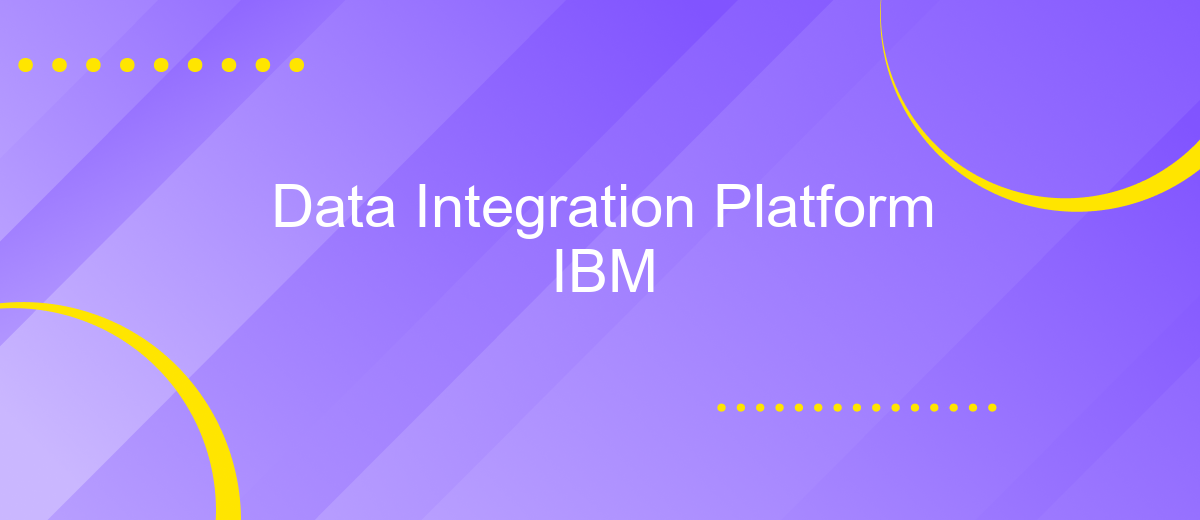Data Integration Platform IBM
The IBM Data Integration Platform is a comprehensive solution designed to streamline and enhance the process of integrating data from diverse sources. By leveraging advanced technologies and intuitive tools, it enables organizations to efficiently manage, transform, and deliver data across their ecosystems. This platform not only improves data accessibility and quality but also empowers businesses to make informed decisions, driving innovation and growth in today's data-driven world.
Introduction to IBM Data Integration Platform
The IBM Data Integration Platform is a comprehensive solution designed to streamline the process of integrating data from diverse sources, ensuring seamless connectivity and data flow across an organization. By leveraging advanced technologies and a user-friendly interface, IBM's platform empowers businesses to efficiently manage, transform, and deliver data where it is needed most, enhancing decision-making and operational efficiency.
- Unified Data Access: Provides centralized access to various data sources, enabling easy retrieval and management.
- Scalability: Supports growing data volumes and complex integration scenarios.
- Security: Ensures data protection with robust security measures and compliance with industry standards.
- Real-time Processing: Facilitates real-time data integration for timely insights and actions.
IBM's Data Integration Platform stands out due to its versatility and robust feature set, making it an invaluable tool for organizations aiming to harness the power of their data. By simplifying the integration process, it reduces the time and resources needed to achieve data-driven goals, positioning businesses to thrive in an increasingly data-centric world.
Key Features and Capabilities

The IBM Data Integration Platform offers a comprehensive suite of tools designed to streamline and enhance data integration processes. With its robust architecture, the platform supports seamless connectivity across diverse data sources, ensuring data consistency and integrity. Users benefit from an intuitive interface that simplifies complex data workflows, making it easier to manage and manipulate data across various environments. The platform's scalability ensures it can handle large volumes of data, catering to the needs of both small and large enterprises. Furthermore, its real-time data processing capability allows for timely insights, essential for informed decision-making.
Incorporating advanced security measures, the IBM Data Integration Platform ensures that data remains protected throughout the integration process. It also offers flexible deployment options, including on-premises, cloud, and hybrid models, providing organizations with the versatility to choose the best fit for their infrastructure. For those looking to enhance their integration capabilities further, services like ApiX-Drive can be integrated to automate data flows and streamline operations. This integration empowers businesses to connect applications effortlessly, reducing manual intervention and increasing operational efficiency. Overall, the IBM Data Integration Platform stands out as a reliable and efficient solution for modern data integration needs.
Benefits of Using IBM Data Integration Platform

The IBM Data Integration Platform offers a comprehensive solution for businesses seeking to streamline their data processes. By integrating disparate data sources, it ensures a seamless flow of information across various systems. This not only enhances data accessibility but also improves decision-making by providing a unified view of enterprise data. The platform is designed to handle large volumes of data efficiently, making it suitable for organizations of all sizes.
- Scalability: The platform can easily adapt to growing data needs, ensuring that businesses can scale without disruption.
- Security: With robust security measures, it protects sensitive data against unauthorized access.
- Flexibility: Supports multiple data formats and sources, offering versatility in data management.
- Cost-Efficiency: Reduces operational costs by automating data integration tasks and minimizing manual efforts.
- Real-Time Data Processing: Facilitates real-time data integration, enabling timely insights and responses.
Incorporating IBM's advanced analytics and AI capabilities, the platform empowers organizations to derive actionable insights from their data. This leads to improved operational efficiency and a competitive edge in the market. By choosing IBM Data Integration Platform, businesses can ensure that they remain agile and responsive to ever-changing data demands.
Use Cases and Examples

IBM's Data Integration Platform is a versatile tool designed to streamline and enhance the process of integrating data from various sources. It offers robust capabilities that cater to a wide range of industries and business needs. By facilitating seamless data flow, it empowers organizations to make informed decisions based on comprehensive and accurate data insights.
One of the primary use cases for IBM's platform is in the healthcare industry. Here, it can integrate patient records from disparate systems, ensuring that healthcare providers have access to a complete view of patient history. This integration supports better patient outcomes through more informed treatment plans and efficient resource management.
- Retail: Integrate sales data from different channels to optimize inventory and personalize customer experiences.
- Finance: Consolidate transaction data for real-time fraud detection and risk management.
- Manufacturing: Harmonize supply chain data to enhance production efficiency and reduce downtime.
In the realm of e-commerce, IBM's platform can unify customer data across multiple touchpoints, enabling businesses to deliver personalized marketing strategies. This not only enhances customer engagement but also drives sales growth by targeting the right audience with the right message at the right time.


Conclusion and Future Directions
In conclusion, the IBM Data Integration Platform stands as a robust solution for organizations seeking to streamline their data management processes. By providing a comprehensive suite of tools, it facilitates seamless integration across various data sources, ensuring data consistency and accessibility. The platform's scalability and flexibility allow businesses to adapt to evolving data needs, making it a vital component in modern data strategies.
Looking ahead, the integration of AI and machine learning capabilities could further enhance the platform's efficiency, enabling predictive analytics and more intelligent data processing. Additionally, incorporating services like ApiX-Drive can simplify the integration setup, offering a user-friendly interface to automate data workflows without extensive coding. As data landscapes continue to evolve, the IBM Data Integration Platform, with potential enhancements, will remain integral to driving innovation and operational excellence in data-driven enterprises.
FAQ
What is IBM Data Integration Platform?
How does IBM Data Integration Platform handle data security?
Can IBM Data Integration Platform integrate with cloud-based applications?
How can businesses automate data integration processes with IBM Data Integration Platform?
What are the key benefits of using IBM Data Integration Platform?
Apix-Drive is a simple and efficient system connector that will help you automate routine tasks and optimize business processes. You can save time and money, direct these resources to more important purposes. Test ApiX-Drive and make sure that this tool will relieve your employees and after 5 minutes of settings your business will start working faster.

